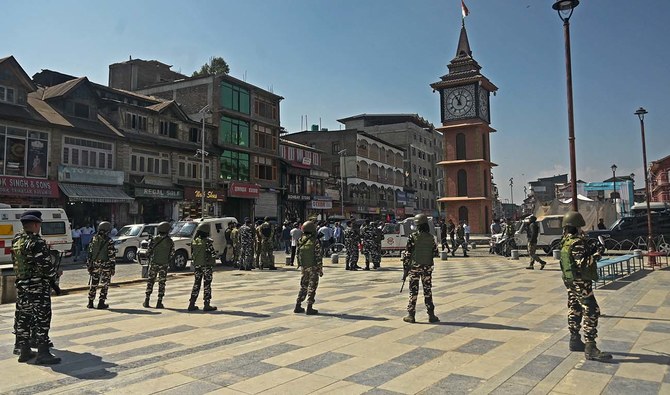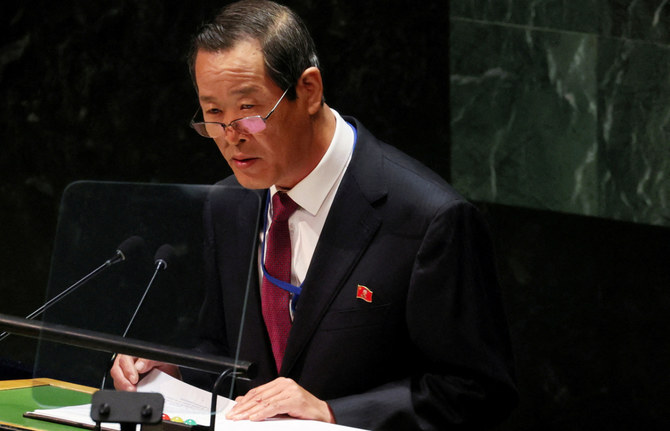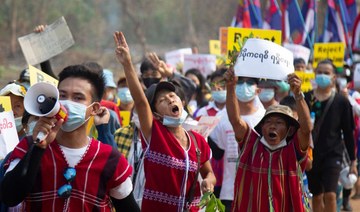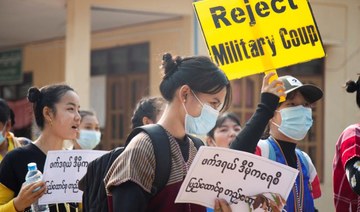YANGON, Myanmar: Myanmar’s wireless broadband Internet services were shut down on Friday by order of the military, a local provider said, as protesters continued to defy the threat of lethal violence to oppose the junta’s takeover.
A directive from the Ministry of Transport and Communications on Thursday instructed that “all wireless broadband data services be temporarily suspended until further notice,” according to a statement posted online by local provider Ooredoo.
Fiber-based landline Internet connections were still working, albeit at drastically reduced speeds.
Also Friday, the New York-based Human Rights Watch issued a report saying that Myanmar’s military has forcibly disappeared hundreds of people, including politicians, election officials, journalists, activists and protesters and refused to confirm their location or allow access to lawyers or family members in violation of international law.
“The military junta’s widespread use of arbitrary arrests and enforced disappearances appears designed to strike fear in the hearts of anti-coup protesters,” said Brad Adams, Human Rights Watch’s Asia director. “Concerned governments should demand the release of everyone disappeared and impose targeted economic sanctions against junta leaders to finally hold this abusive military to account.”
The crisis in the Southeast Asian nation has expanded sharply in the past week, both in the number of protesters killed and with military airstrikes against the guerrilla forces of the Karen ethnic minority in their homeland along the border with Thailand.
In areas controlled by the Karen, more than a dozen civilians have been killed since Saturday and more than 20,000 have been displaced, according to the Free Burma Rangers, a relief agency operating in the area.
About 3,000 Karen fled to Thailand, but many returned under unclear circumstances. Thai authorities said they went back voluntarily, but aid groups say they are not safe and many are hiding in the jungle and in caves on the Myanmar side of the border.
The UN Human Rights Office for Southeast Asia called on countries in the region “to protect all people fleeing violence and persecution in the country” and “ensure that refugees and undocumented migrants are not forcibly returned,” UN spokesman Stephane Dujarric told reporters at UN headquarters in New York.
The UN Security Council late Thursday strongly condemned the use of violence against peaceful protesters. The press statement was unanimous but weaker than a draft that would have expressed its “readiness to consider further steps,” which could include sanctions. China and Russia, both permanent Council members and both arms suppliers to Myanmar’s military, have generally opposed sanctions.
The statement came after the UN special envoy for Myanmar warned the country faces the possibility of civil war and urged significant action be taken or risk it spiraling into a failed state.
Earlier this week, an opposition group consisting of elected lawmakers who were not allowed to be sworn into office Feb. 1 put forth an interim charter to replace Myanmar’s 2008 constitution. By proposing greater autonomy for ethnic minorities, it aims to ally the armed ethnic militias active in border areas with the mass protest movement based in cities and towns.
More than a dozen ethnic minority groups have sought greater autonomy from the central government for decades, sometimes through armed struggle. Even in times of peace, relations have been strained and cease-fires fragile. Several of the major groups – including the Kachin, the Karen and the Rakhine Arakan Army – have denounced the coup and said they will defend protesters in their territories.
The coup reversed years of slow progress toward democracy in Myanmar, which for five decades languished under strict military rule that led to international isolation and sanctions. As the generals loosened their grip, culminating in Aung San Suu Kyi’s rise to leadership in 2015 elections, the international community responded by lifting most sanctions and pouring investment into the country.
Myanmar cuts wireless Internet service amid coup protests
https://arab.news/ws9ag
Myanmar cuts wireless Internet service amid coup protests

- Directive instructs ‘all wireless broadband data services be temporarily suspended until further notice’
- Fiber-based landline Internet connections are still working, albeit at drastically reduced speed
Suspected Kashmir rebels kill Indian air force corporal

- Suspected rebels ambushed military convoy in Indian-administered Kashmir, Indian Air Force says
- Since 1989, rebel groups opposed to Indian rule have waged insurgency in disputed territory
SRINAGAR, India: An Indian air force member was killed and four more injured when suspected rebels ambushed a military convoy in Indian-administered Kashmir, an official statement said, as campaigning for national elections continues in the disputed territory.
The convoy was attacked by an unknown number of armed militants who sprayed automatic rifle fire toward at least one air force truck in the mountainous Poonch area, 200 kilometers (124 miles) south of the main city of Srinagar, the air force said in a statement.
Five air force personnel were hit in the firefight late Saturday and “one Air Warrior succumbed to his injuries later,” it said, identifying the dead man as a corporal.
A neighboring constituency took part in the first phase of India’s general election on April 19, and Poonch voters were originally scheduled to cast their ballots this week but the Election Commission of India has postponed the polling to May 25 because of inclement weather in recent days.
Kashmir has been divided between India and Pakistan since their independence in 1947, with both claiming the high-altitude territory in full but administering it in parts.
Since 1989, rebel groups opposed to Indian rule have waged an insurgency in Indian-controlled Kashmir, demanding either independence or a merger with Pakistan.
The conflict has left tens of thousands of civilians, soldiers and militants dead.
Rebel activity in the territory has registered an uptick since last month as campaigning for the elections picked up in the restive region.
In April, three suspected rebels were killed and a police officer and three soldiers wounded in three separate clashes across the territory.
Violence has drastically dropped since 2019, when Prime Minister Narendra Modi’s government revoked the region’s limited autonomy and stepped up a security chokehold.
Voting in India’s six-week-long national election, which started last month, will end on June 1.
Driver dies after crashing into White House perimeter gate, Secret Service says

- The driver was not immediately identified
WASHINGTON: A driver died after crashing a vehicle into a gate at the White House Saturday night, authorities said.
The driver was found dead in the vehicle following the crash shortly before 10:30 p.m. at an outer perimeter gate of the White House complex, the US Secret Service said in a statement.
Security protocols were implemented but there was no threat to the White House, the agency said.
The driver was not immediately identified.
The Secret Service will continue to investigate the matter, while turning over the fatal crash portion of the investigation to the Washington Metropolitan Police Department, the agency said.
Fake videos of Modi aides trigger political showdown in India election

- Indian police arrest nine people for circulating fake video of Indian Home Minister Amit Shah
- With more than 800 million Internet users, tackling misinformation in India is a huge challenge
BENGALURU/LUCKNOW: Manipulated videos are taking center stage as campaigning heats up in India’s election, with fake clips involving two top aides of Prime Minister Narendra Modi triggering police investigations and the arrest of some workers of his rival Congress party.
In what has been dubbed as India’s first AI election, Modi said last week fake voices were being used to purportedly show leaders making “statements that we have never even thought of,” calling it a conspiracy “to create tension in society.”
Indian police — already investigating the spread of fake videos showing Bollywood actors criticizing Modi — are now investigating a doctored online clip that showed federal home minister Amit Shah saying the ruling Bharatiya Janata Party will stop certain social guarantees for minorities, a subject sensitive for millions of voters.
Shah retorted on X, posting his “original” and the edited “fake” speech and alleging — without providing any evidence — that the main opposition Congress was behind the video it created to mislead the public. The minister said “directions have been issued to the police to address this issue.”
Indian police arrested at least nine people, including six members of Congress’ social media teams, in the states of Assam, Gujarat, Telangana and New Delhi last week for circulating the fake video, according to police statements.
Five of the Congress workers were released on bail, but the most high-profile arrest made by the cybercrime unit of New Delhi police came on Friday, when they detained a Congress national social media coordinator, Arun Reddy, for sharing the video. New Delhi is one region where Shah’s ministry directly controls police. Reddy has been sent into three-day custody.
The arrest has sparked protests from Congress workers with many posting on X using the #ReleaseArunReddy tag. Congress lawmaker Manickam Tagore said the arrest was an example of “authoritarian misuse of power by the regime.”
Congress’ head of social media, Supriya Shrinate, did not respond to messages and an email seeking comment.
MISINFORMATION
India’s election from April 19 to June 1 will be the world’s largest democratic event. With nearly a billion voters and more than 800 million Internet users, tackling the spread of misinformation is a high stakes job. It involves round-the-clock monitoring by police and election officials who often issue take down orders to Facebook and X as investigations start.
In India’s most populous state of Uttar Pradesh, more than 500 people keep tabs on online content, flagging controversial posts and coordinating with social media companies for their removal when needed, police chief Prashant Kumar told Reuters on Saturday.
Another fake video that sparked a storm last week showed Yogi Adityanath, the state’s chief minister, criticizing Modi for not doing enough for families of those who died in a 2019 militant attack. Though fact checkers said the video was created using different parts of an original clip, state police called it an “AI generated, deepfake.”
Using Internet address tracking, state police arrested a man named Shyam Gupta on May 2 who had shared the fake video post on X a day earlier, receiving over 3,000 views and 11 likes.
The police have accused Gupta of forgery and promoting enmity under Indian law provisions that can carry a jail term of up to seven years if convicted. Reuters could not reach him as he is currently serving a 14-day custody period.
“This person is not a tech guy. Had he been tech savvy, arresting him quickly would not have been possible,” said police officer Kumar.
Australian police shoot boy dead after stabbing with ‘hallmarks’ of terrorism

SYDNEY,: Australian police said on Sunday they had shot dead a boy after he stabbed a man in Western Australia’s capital Perth, in an attack authorities said indicated terrorism.
There were signs the 16-year-old, armed with a kitchen knife, had been radicalized online, state authorities said, adding they received calls from concerned members of the local Muslim community before the attack, which occurred late on Saturday night.
The attack, in the suburb of Willetton, had “hallmarks” of terrorism but was yet to be declared a terrorist act, police said.
“At this stage it appears that he acted solely and alone,” Western Australia Premier Roger Cook told a televised press conference in the state capital Perth, regarding the attacker.
The victim, stabbed in the back, was stable in hospital, authorities said.
Prime Minister Anthony Albanese said he had been briefed on the incident by police and intelligence agencies, which advised there was no ongoing threat.
“We are a peace-loving nation and there is no place for violent extremism in Australia,” Albanese said on social media platform X.
The incident comes after New South Wales police last month charged several boys with terrorism-related offenses in investigations following the stabbing of an Assyrian Christian bishop while he was giving a live-streamed sermon in Sydney, on April 15.
The attack on the bishop came only days after a stabbing spree killed six in the Sydney beachside suburb of Bondi.
Gun and knife crime is rare in Australia, which consistently ranks among the safest countries in the world, according to the federal government. (Reporting by Sam McKeith in Sydney; Editing by Christian Schmollinger and William Mallard)
North Korea’s UN ambassador says new sanctions monitoring groups will fail

- Earlier this year, Russia vetoed the annual renewal of a panel of experts amid US-led accusations that North Korea has transferred weapons to Russia for use in its war in Ukraine
SEOUL: Efforts led by the US and other Western countries to form new groups to monitor sanctions on North Korea will fail, the country’s UN envoy said on Sunday, according to state media KCNA.
Ambassador Kim Song made the comment in response to a joint statement the US and its allies issued this week calling to continue the work of a UN panel of experts monitoring longstanding sanctions against Pyongyang for its nuclear weapons and missile programs.
Earlier this year, Russia vetoed the annual renewal of the panel amid US-led accusations that North Korea has transferred weapons to Russia for use in its war in Ukraine.
“The hostile forces may set up the second and third expert panels in the future but they are all bound to meet self-destruction with the passage of time,” KCNA quotes Kim as saying in a statement.
Last month, US Ambassador to the United Nations Linda Thomas-Greenfield visited the Demilitarized Zone, a heavily fortified border between the two Koreas, which remain technically at war and urged Russia and China to stop rewarding North Korea for its bad behavior.
Her trip came after Russia rejected the annual renewal of the multinational panel of experts that has over the past 15 years monitored the implementation of UN sanctions aimed at curbing North Korea’s nuclear and missile programs.
















